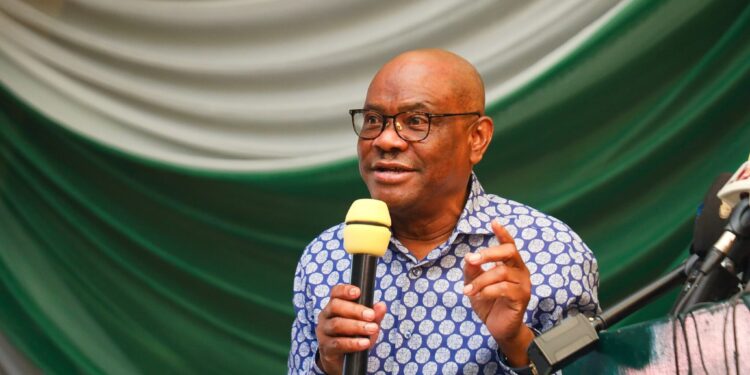The Minister of the Federal Capital Territory (FCT), Mr Nyesom Wike, is mobilising Abuja youths and other stakeholders against joining the planned Aug. 1 to 10 nationwide protests over hunger and hardship.
Speaking during a ministerial engagement with FCT youths from Abuja South Federal Constituency, in Kwali Area Council of the FCT on Sunday, Wike said:”youths and other stakeholders in Bwari and Gwagwalada Area Councils will also be engaged on the same issue in the coming days”.
The News Agency of Nigeria (NAN) reports that a similar interaction was held with stakeholders in Abuja Municipal Area Council, in Abuja on Saturday.
The minister explained that the interaction was to enlighten them on the ills of protest and why they should not be part of it.
He thanked the traditional rulers and the area council chairmen for mobilising FCT yours for the interaction to enlighten them against joining a protest they do not have a stake in.
“There is no need for the protest. The current administration is barely one year in office and not enough to assess its performance.
“You can’t judge leadership within one year. I have not been in office for up to a year, but I have done so much that should be appreciated and convince people that FCT is working,” he said.
The minister said that so much has been achieved in education, health and other sectors, particularly security.
He urged residents to commend and encourage the security agencies to do more, adding that it would be unfair not to do so.
“It is not fair to say we have not done anything on insecurity when we have improved security in FCT.
He said that in view of the current development in the FCT, what was desired was peace and not protest.
“We want peace in FCT and so, we cannot fold our hands and allow it to be destroyed in the guise of protest,” Wike said.
On the proposed Federal Capital Territory University of Science and Technology, Abaji, the minister said that efforts were on top gear to ensure that the university was one of the best in the country.
“I don’t want to set up a glorified university. I want to put up a university that we will all be proud to have, and gladly tell the world that this is the university I attended.
“We are currently on procurement to build classrooms; to build lecture theatres, and laboratories for the university,” he said.
Speaking on land matters, the minister said: “The problem of Abuja is land. Once you’re made a minister, it is as if you are coming to share land.
“Nobody talks about development. Everybody is land, land, land, land, land. I feel so bad. Each time I am in my office, when 20 people come to see me,18 will talk about land.
“Nobody will talk about infrastructure; nobody will talk about no hospitals; nobody will talk about no schools, everything is, I need 20 hectares of land and I say, ‘if you carry all this land, where will the indigenous people stay?”
Wike urged the youths to cooperate with the current government and stay away from the planned protest organised by people whose agenda was not so clear. (NAN)











